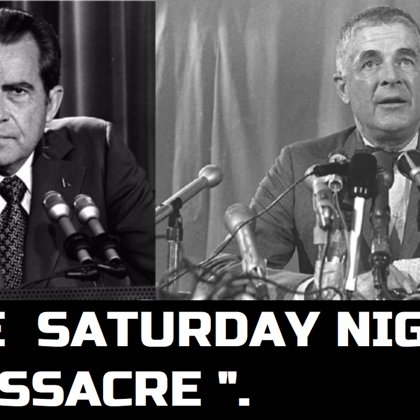"THE SATURDAY NIGHT MASSACRE". THE REASON,PRESIDENT RICHARD NIXON'S WATERGATE SCANDALS ESCALATES,RICHARD NIXON TOOK A RISK BY DISMISSING AND FIRING THE SPECIAL PROSECUTOR IN THE WATERGATE CASE,ARCHIBALD COX.
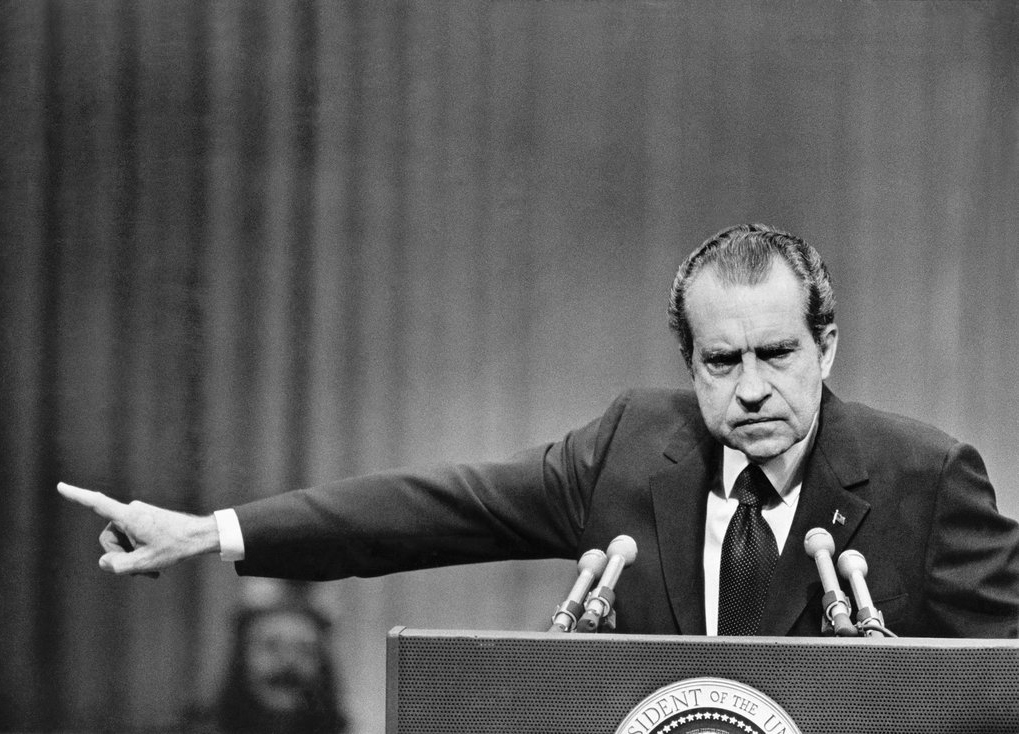 Prior to July 16th, 1973, the Watergate scandal remained containable. Despite the revelations of the Washington Post,
the high drama of Sam Ervin's televised Senate hearings, John Dean's
incriminating testimony, there was still no direct evidence of Richard
Nixon's wrongdoing - nor did there seem likely to be. Just a lot of
smoke, mirrors and contradictory counterclaims, which could be chalked
up to partisan grandstanding.
Prior to July 16th, 1973, the Watergate scandal remained containable. Despite the revelations of the Washington Post,
the high drama of Sam Ervin's televised Senate hearings, John Dean's
incriminating testimony, there was still no direct evidence of Richard
Nixon's wrongdoing - nor did there seem likely to be. Just a lot of
smoke, mirrors and contradictory counterclaims, which could be chalked
up to partisan grandstanding.
This is where Nixon’s tragedy began. Then came the circumstances surrounding the Saturday Night Massacre on 20th of October 1973 which led to his ‘overthrow’. That night, Nixon asked US Attorney General Elliot Richardson to dismiss Cox but he refused and resigned in protest. Then Nixon asked Deputy Attorney General William Ruckelshaus to fire Cox but he also refused and resigned.Nixon then asked the third-most-senior official at the Justice Department Robert Bork to dismiss Cox and he agreed. However, the public opinion went against Nixon and people accused him of obstruction of justice, eventually leading to his resignation.In 1973, then-President Richard Nixon was embroiled in scandal. After The Washington Post published a series of articles linking Nixon to the Watergate scandal, the president began a campaign to cover-up his involvement as a federal investigation into his administration heated up. All of this culminated in a mass firing, a near-impeachment, and one of the biggest scandals in US history. It all came to a head on October 20, 1973 during what is now known as the Saturday Night Massacre. After some back and forth between Nixon and the prosecutor, some were released, but parts of the recordings were missing. It was speculated these missing pieces included critical evidence against Nixon.After more than a year of Watergate, Nixon had had enough. He ordered Attorney General Elliot Richardson and his deputy William Ruckelshaus, two of his cabinet members, to fire Cox (whom he had appointed in the first place).But both men refused the order and resigned out of protest. This is the event that became known as the Saturday Night Massacre. After Richardson stepped down, the Acting Attorney General, Robert Bork, hesitantly executed the order and told Cox to pack his things and leave. Immediately after the White House announced these sudden personnel changes, Nixon ordered the FBI to seal off Cox's offices to prevent any furtherOrchestrated by Nixon, the Saturday Night Massacre accelerated the Watergate scandal into a full-blown constitutional crisis, and laid the groundwork for Nixon's subsequent resignation six months later. Ultimately, after the fallout from the Saturday Night Massacre played out, the House of Representatives moved to impeach Nixon before he formally resigned on August 9, 1974, the only president ever to do so, one of the biggest scandals in US history.The political massacre, Saturday Night Massacre, which ‘overthrew’ Nixon. President Richard Nixon that day was trying to get rid of the special prosecutor Archibald Cox investigating the Watergate scandal. His attorney general, Elliot Richardson, refused to carry out the order and resigned. Richardson’s deputy, William Ruckelshaus, who immediately became acting attorney general, also refused, and he followed Richardson out the door.In the end, President Nixon succeeded in getting the special prosecutor discharged.Senior members of both parties in the House of Representatives were reported to be seriously discussing impeachment of the President because of his refusal to obey an order by the United States Court of Appeals that he turn over to the courts tape recordings of conversations about the Watergate case, and because of Mr. Nixon's dismissal of Mr. Cox. “Watergate” is a general term used to describe a complex web of political scandals between 1972 and 1974. The word specifically refers to the Watergate Hotel in Washington D.C.Whilst is is now a term synonymous with corruption and scandal, in 1972 the Watergate was one of Washington’s plushest hotels. It also houses office complexes and residential apartments.Nixon made three major speeches on the Watergate scandal during 1973 and 1974. The first was on April 30, 1973, in which he announced the departure of Dean, Haldeman and Ehrlichman. A more defiant speech was delivered on August 15, 1973. Perhaps the politically most difficult speech was the one on April 29, 1974, in which Nixon released partial transcripts of the White House tapes.
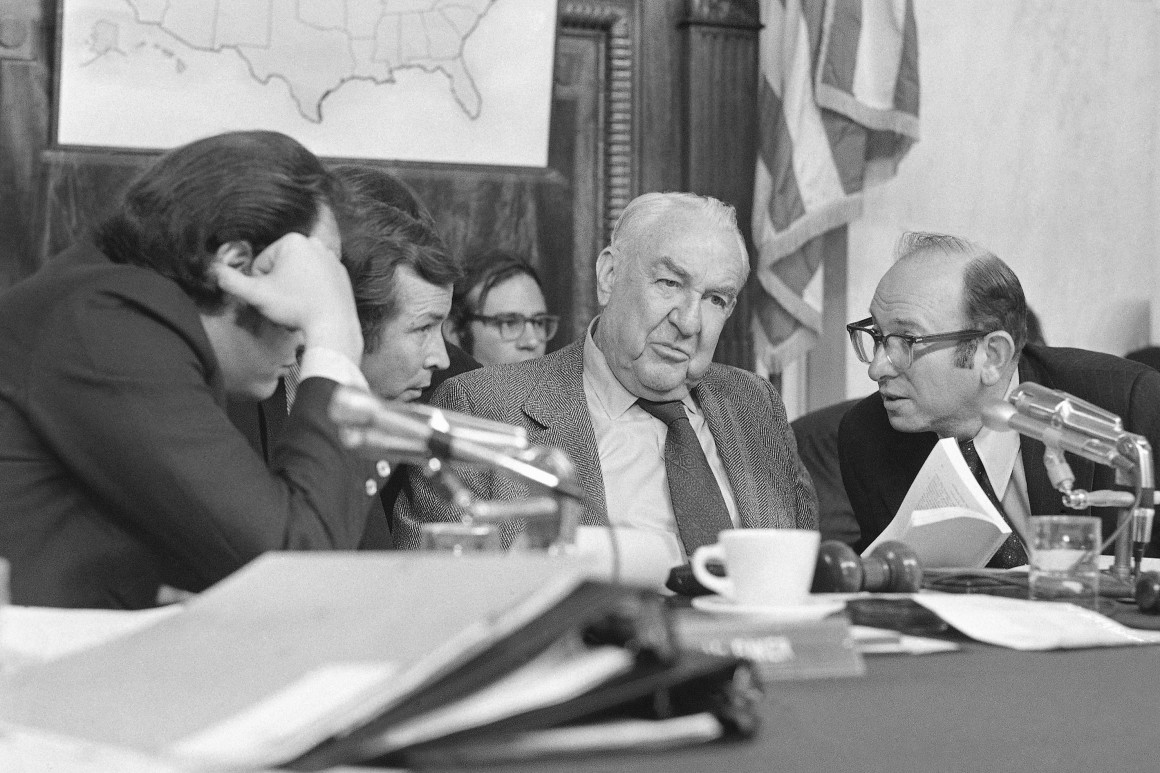 On this day in 1973 the U.S. Senate began their hearings on the Watergate scandal- the hearings would last until August 7th. The three major networks at the time agreed to take turns in telecasting the hearings. A key moment was when White House assistant Alexander Butterfield was asked if there was any type of recording system at the White House. Butterfield was kind of reluctant to answer but did- saying that there was a new recording system in the Oval Office, Cabinet Room, as well as in the private office of President Nixon’s in the Old Executive Office Building. Without the tapes does Nixon survive his presidency? He would resign on August 8, 1974 after a long drawn out affair. When the Republicans in the U.S. Senate turned against him the gig was up. The system worked.
On this day in 1973 the U.S. Senate began their hearings on the Watergate scandal- the hearings would last until August 7th. The three major networks at the time agreed to take turns in telecasting the hearings. A key moment was when White House assistant Alexander Butterfield was asked if there was any type of recording system at the White House. Butterfield was kind of reluctant to answer but did- saying that there was a new recording system in the Oval Office, Cabinet Room, as well as in the private office of President Nixon’s in the Old Executive Office Building. Without the tapes does Nixon survive his presidency? He would resign on August 8, 1974 after a long drawn out affair. When the Republicans in the U.S. Senate turned against him the gig was up. The system worked.
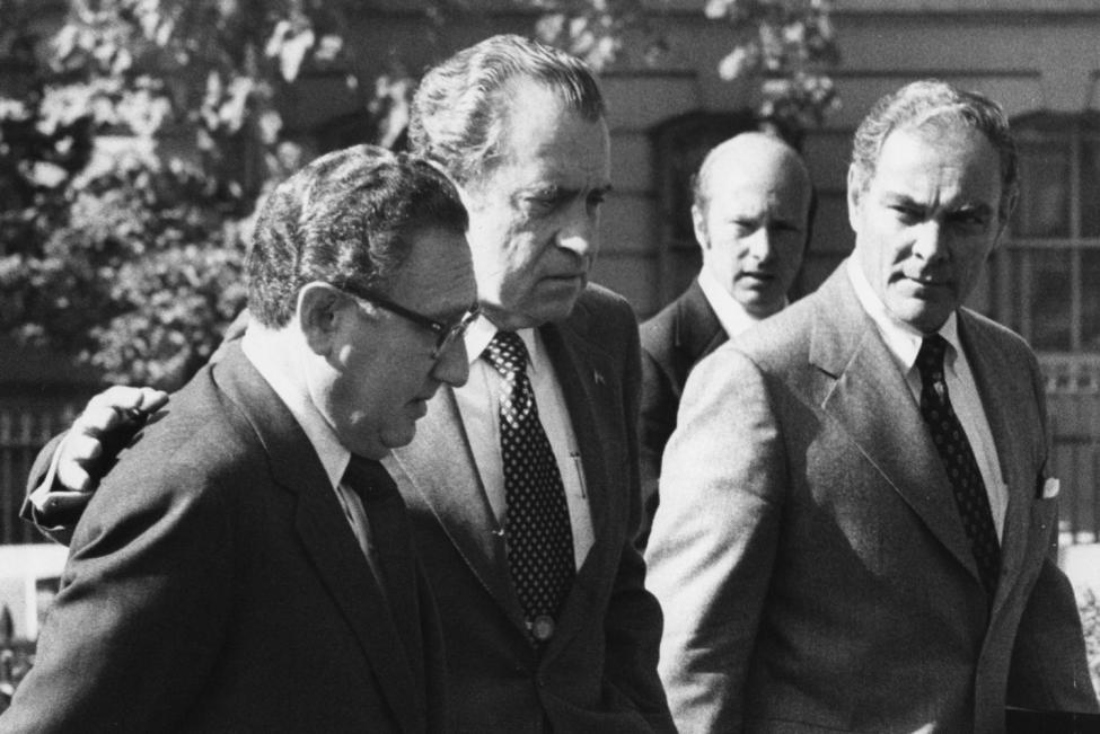 President Nixon is pictured with Chief-of-Staff Alexander Haig (R) and Secretary of state Henry Kissinger (L) at the White House on October 25, 1973.Nixon denied that any of the three had done anything wrong. He said Kleindienst left because the Justice Department needed an attorney general who could investigate Watergate. Kleindienst had a conflict of interest because his predecessor, John Mitchell, had left to run Nixon's reelection campaign (which had hired Liddy, Hunt, and the burglars to conduct the Watergate break-in).
President Nixon is pictured with Chief-of-Staff Alexander Haig (R) and Secretary of state Henry Kissinger (L) at the White House on October 25, 1973.Nixon denied that any of the three had done anything wrong. He said Kleindienst left because the Justice Department needed an attorney general who could investigate Watergate. Kleindienst had a conflict of interest because his predecessor, John Mitchell, had left to run Nixon's reelection campaign (which had hired Liddy, Hunt, and the burglars to conduct the Watergate break-in).
The Saturday Night Massacre was a result of the investigation into Watergate and Nixon's possible involvement. On June 17, 1972, five men were arrested in the headquarters of the Democratic National Committee in Washington's Watergate Hotel. An investigation into the burglary determined that some of the conspirators had direct ties to the White House and Nixon's re-election campaign. The arrests led to a full-blown investigation of the White House. Officials began speculating White House staff - and possibly Nixon himself - were involved in the burglary and the cover up. On the night of June 17, 1972, while the nation slept, burglars broke into the Watergate Building in Washington, D.C. and ransacked the headquarters of the Democratic Party. But the burglars were caught after a security guard noticed something awry and alerted the police. Police identified the burglars as Nixon aides who were working for his re-election campaign. Let's pause a minute and note that this campaign was called the Committee to Re-Elect the President and was actually nicknamed 'CREEP.' That already puts the President in a negative light.Like many criminal suspects do, Nixon maintained he had no relation to the crime and didn't even know about the break-in. Trying to convince both investigators and the American people of his innocence, Nixon even appointed a special prosecutor, Archibald Cox, to take over and lead the case. Investigators began to explore the crime scene and look for suspects.In February 1973, the Senate Select Committee on Presidential Campaign Activities was created, focused primarily on the Watergate affair.The investigation was led by Special Prosecutor Archibald Cox who discovered that Nixon regularly taped himself while inside the Oval Office. Cox subpoenaed nine tapes of conversations Nixon had with senior level advisors. Cox felt the tapes would either confirm the President's assertion that he was unaware of the Watergate burglary; or the much-believed theory that he was involved in obstruction of justice. Nixon refused to release the tapes and ordered Cox be fired on Saturday, October 20, 1973. Attorney General Elliot Richardson and Deputy Attorney General William Ruckelshaus refused to fire Cox and resigned in protest. The fallout added to the air of desperation and isolation that was rapidly descending upon the Nixon White House, and the press dubbed the series of events The Saturday Night Massacre.In May 1973, the Senate Committee investigating the Watergate affair began nationally televised hearings. These hearings became must-see TV for the American people and the national media, as investigators dug deeply into the machinations and personalities of the high profile individuals involved in the Nixon administration. That unenviable task fell to Archibald Cox, the Watergate Special Prosecutor. Bow-tied and gray-haired, former Solicitor General and occasional Harvard Professor, semi-retired and partially deaf, Cox seemed perfect for a nonpartisan investigation. In fact, as Rick Perlstein writes, he represented "everything Richard Nixon hated," and he found the President little interested in cooperating. As early as April, in fact, Cox had learned of the taping system and requested relevant excerpts. Nixon's attorney, Fred Buzhardt, flatly refused, setting the tone for their relationship.After Nixon declined a subpoena from Cox, Judge John Sirica issued a summons for the President to defend his actions. On August 22nd, Cox and presidential counsel Charles Alan Wright clashed in Sirica's courtroom. When Wright again pleaded executive privilege, Cox insisted, "Not even a President can be allowed to select some accounts of a conversation for public disclosure and then to frustrate further grand jury inquiries by withholding the best evidence of what actually took place."Cox then demanded Nixon either comply with subpoena or "dismiss the case," adding that if he follows the latter course, "the people will know where the responsibility lies." Wright responded with a veiled threat, commenting that "Whether a decision adverse to the President could be enforced is a question." Judge Sirica issued his decision on August 29th, requesting that Nixon turn the tapes over to him. The President suggested he'd appeal Sirica to the Supreme Court while adding that he might look for ways to "otherwise sustain" his position.
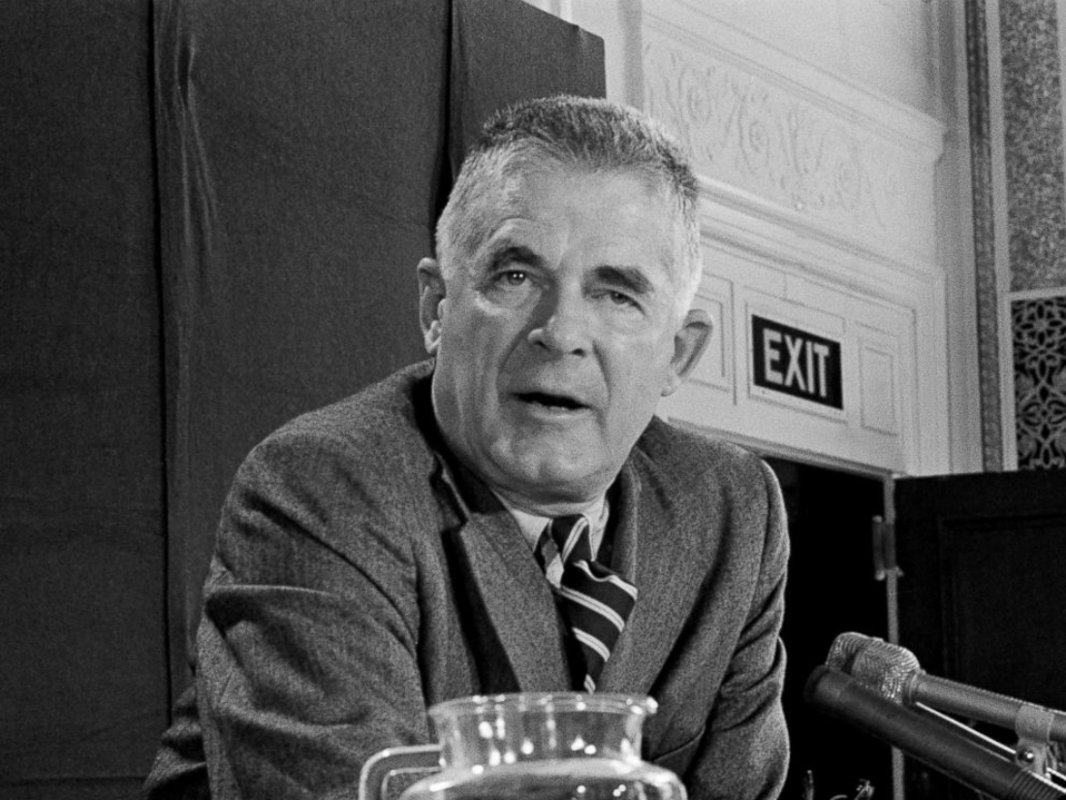 Saturday Night Massacre on 20th of October 1973 which led to his ‘overthrow’. That night, Nixon asked US Attorney General Elliot Richardson to dismiss special prosecutor Archibald Cox but he refused and resigned in protest. Then Nixon asked Deputy Attorney General William Ruckelshaus to fire Cox but he also refused and resigned.
Saturday Night Massacre on 20th of October 1973 which led to his ‘overthrow’. That night, Nixon asked US Attorney General Elliot Richardson to dismiss special prosecutor Archibald Cox but he refused and resigned in protest. Then Nixon asked Deputy Attorney General William Ruckelshaus to fire Cox but he also refused and resigned.
In the most traumatic government upheaval of the Watergate crisis, President Nixon yesterday discharged special prosecutor Archibald Cox and accepted the resignations of Attorney General Elliot L. Richardson and Deputy Attorney General William D. Ruckelshaus.The President also abolished the office of the special prosecutor and turned over to the Justice Department the entire responsibility for further investigation and prosecution of suspects and defendants in Watergate and related cases.Shortly after the White House announcement, FBI agents sealed off the offices of Richardson and Ruckelshaus in the Justice Department and at Cox's headquarters in an office building on K Street NW.An FBI spokesman said the agents moved in "at the request of the White House."Agents told staff members in Cox's office they would be allowed to take out only personal papers. A Justice Department official said the FBI agents and building guards at Richardson's and Ruckelshaus' offices were there "to be sure that nothing was taken out."Richardson resigned when Mr. Nixon instructed him to fire Cox and Richardson refused. When the President then asked Ruckelshaus to dismiss Cox, he refused, White House spokesman Ronald L. Ziegler said, and he was fired. Ruckelshaus said he resigned.Finally, the President turned to Solicitor General Robert H. Bork, who by law becomes acting Attorney General when the Attorney General and deputy attorney general are absent, and he carried out the President's order to fire Cox. The letter from the President to Bork also said Ruckelshaus resigned.These dramatic developments were announced at the White House at 8:25 p.m. after Cox had refused to accept or comply with the terms of an agreement worked out by the President and the Senate Watergate committee under which summarized material from the White House Watergate tapes would be turned over to Cox and the Senate committee.In announcing the plan Friday night, the President ordered Cox to make no further effort to obtain tapes or other presidential documents.Cox responded that he could not comply with the President's instructions and elaborated on his refusal and vowed to pursue the tape recordings at a televised news conference.That set in motion the chain of events that resulted in the departure of Cox and the two top officials of the Justice Department and immediately raised prospects that the President himself might be impeached or forced to resign.In a statement last night, Cox said: "Whether ours shall continue to be a government of laws and not of men is now for Congress and ultimately the American people."The action raised new questions as to whether Congress would proceed to confirm House Minority Leader Gerald R. Ford of Michigan to be Vice President or leave Speaker of the House Carl Albert (D-Okla.) next in line of succession to the highest office in the land.Richardson met at the White House in the late afternoon with Mr. Nixon and at 8:25 p.m. Ziegler appeared in the White House press room to read a statement outlining the President's decisions.The President discharged Cox because he "refused to comply with instructions" the President gave him Friday night through the Attorney General, Ziegler said.Furthermore, Ziegler said, the office of special prosecutor was abolished and its functions have been turned over to the Department of Justice.The department will carry out the functions of the prosecutor's office "with thoroughness and vigor," Ziegler said.Mr. Nixon sought to avoid a constitutional confrontation by the action he announced Friday, the press secretary said, to give the courts the information from the tapes which the President had considered privileged.That action was accepted by "responsible leaders in the Congress and in the country," Ziegler commented, but the special prosecutor "defied" the President's instructions "at a time of serious world crisis" and made it "necessary" for the President to discharge him.Before taking action, Ziegler said, the President met with Richardson to instruct him to dismiss Cox, but Richardson felt he could not do so because it conflicted with the promise he had made to the Senate, Ziegler said.After Richardson submitted his resignation, the President directed Ruckelshaus to dismiss Cox. When Ruckelshaus refused to carry out the President's directive, he also was "discharged," Ziegler said. The President's letter to Bork said Ruckelshaus resigned.Mr. Nixon then directed Bork to carry out the instruction. Bork did so in a two-paragraph letter to Cox, in which he said that at the instruction of the President he was "discharging you, effective at once, from your position as special prosecutor, Watergate special prosecution force."Bork signed his letter as "acting Attorney General."Richardson told the President in his letter that he was resigning with "deep regret." He explained that when named Attorney General "you gave me the authority to name a special prosecutor."Richardson expressed "lasting gratitude" to the President, under whom he also served as under secretary of state, Secretary of Health, Education and Welfare and Secretary of Defense. He became Attorney General in May after the resignation of Richard G. Kleindienst, who explained that because of his close association with former Attorney General John N. Mitchell and others involved in Watergate he did not believe he should stay in the post and carry out their prosecution. However, the public opinion went against Nixon and people accused him of obstruction of justice, eventually leading to his resignation.In 1974, the House of Representatives authorised the Judiciary Committee to consider impeachment proceedings against Nixon.Nixon’s last days in office came in late July and early August, 1974. The House Judiciary Committee voted to accept three of four proposed Articles of Impeachment, with some Republicans voting with Democrats to recommend impeachment of the President.
 At 9pm on the evening of August 8, 1974, Nixon delivered a nationally
televised resignation speech. The next morning, he made his final
remarks to the White House staff before sending his resignation letter
to the Secretary of State, Dr. Henry Kissinger.Gerald Ford became the 38th President of the United States when Nixon
resigned on August 9, 1974. He was the first Vice-President and the
first President to ascend to both positions without being elected.
Regarded on all sides of politics as a decent man, Ford will be
remembered for his controversial pardon of Richard Nixon.
At 9pm on the evening of August 8, 1974, Nixon delivered a nationally
televised resignation speech. The next morning, he made his final
remarks to the White House staff before sending his resignation letter
to the Secretary of State, Dr. Henry Kissinger.Gerald Ford became the 38th President of the United States when Nixon
resigned on August 9, 1974. He was the first Vice-President and the
first President to ascend to both positions without being elected.
Regarded on all sides of politics as a decent man, Ford will be
remembered for his controversial pardon of Richard Nixon.
